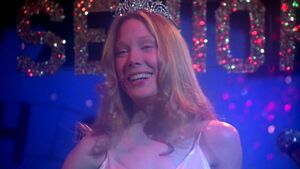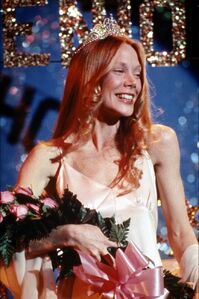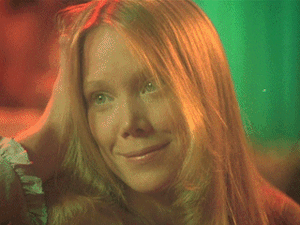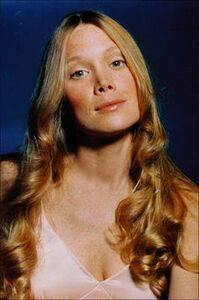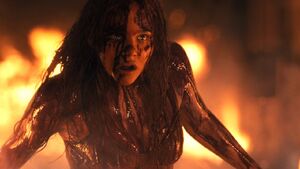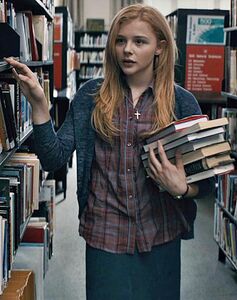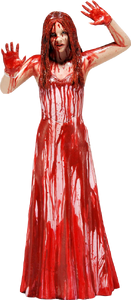| This article's content is marked as Mature The page Carrie White contains mature content that may include coarse language, sexual references, and/or graphic violent images which may be disturbing to some. Mature articles are recommended for those who are 18 years of age and older. If you are 18 years or older or are comfortable with graphic material, you are free to view this page. Otherwise, you should close this page and view another page. |
|
| “ | Jesus watches from the wall, but His face is cold as stone. And if he loves me - as she tells me - why do I feel so all alone? | „ |
| ~ Words of Carrie White (describing both the crucified Jesus statuette in Margaret White's Prayer Closet and her loneliness in her poem/journal). |
| “ | Everyone isn't bad, Mama! Everything isn't a sin! | „ |
| ~ Carrie White to her mother Margaret in Carrie (1976). |
| “ | Does everyone think they can go on playing tricks on me? | „ |
| ~ Carrie White in Carrie (2002). |
| “ | The other kids they- they think I'm weird, but I don't wanna be, I have to try and be a whole person before it's too late. | „ |
| ~ Carrie White in Carrie (2013). |
Carietta Nadine "Carrie" White (September 21, 1963 - May 25, 1979) is the titular main protagonist of Stephen King's controversial first horror novel Carrie written and published in 1974.
In the introduction to the book, King states that the character of Carrietta White was based off of two real girls who he knew in his adolescent years while in grade school. Both girls were bullied to death and were the inspiration for King's novel. Carrie is the main anti-villain of the story. She is the tortured soul turned murderous villain whom the third party can root for with guilty pleasure. The true villains who are strictly the antagonists throughout the entire plot are her worst enemy Chris Hargensen, the sociopathic and popular school bully with a wealthy lawyer father, and her severely mentally ill mother Margaret White, a religious and abusive fundamentalist.
She was portrayed by actress Sissy Spacek in the classic 1976 film, Angela Bettis (and Jodelle Ferland as a child, whom also played Alessa Gillespie/Sharon Da Silva in Silent Hill, and Alexis Baxter in Home Alone 5: The Holiday Heist) in the 2002 made-for-TV movie, Chloe Grace Moretz (who also played Hit-Girl in the Kick-Ass films, Abby in Let Me In, Cassie Sullivan in The 5th Wave, Kayla Forester in Tom & Jerry (2021), and also voiced young Penny in Bolt, Red Shoes in Red Shoes and the Seven Dwarves, and Wednesday Addams in The Addams Family animated films) in the 2013 remake, and in the original 1988 musical by stage singer and performer Linzi Hately. In the Japanese dub, she was voiced by Megumi Han.
Overview[]
The character of Carrie has a history that is bizarre and tragic. Her story is a thought provoking and cautionary tale about social isolation, peer pressure, religion and the outcome of bullying. She was the only child of Ralph and Margaret White. Both of her parents were fundamentalist Christians and promised each other to never have sex before marriage. Margaret most likely never wanted children. However, Ralph raped Margaret one night when he came home drunk from a Roadhouse down the street from their house. Though Margaret put up a fight at first, she eventually admitted on the same night of her death, that she smelled the whiskey on his breath and she liked it. Carrie's father eventually left her mother when he got another woman pregnant, and died shortly after. Margaret was left all alone to give birth to her daughter in her own home, whom she named Carrietta, the girl better known as Carrie.
Personality[]
Carrie has two faces, one being the victim she is made into by her circumstances and the other being the villain she transforms into. Thus giving her two separate characters that dwell inside of her inner psyche, like a second twin of the opposite or split personality. Throughout her story in both the book and the movie, Carrie's first persona was a humble one. She was portrayed to be a loner, shown also as a shy and timid young woman with no confidence. Carrie appeared to suffer from bipolar disorder, or possibly post-traumatic stress disorder.
Carrie was a fractured young soul, in need of support and love, but it was only handed to her in small amounts, and at a very high cost. Carrie was a girl who had a traumatizing childhood and longed for a friend and someone who truly understood her pain and suffering. Alas, she let her telekinesis get the better of her and this, coupled with all the abuse she suffered, caused her to undergo a villainous transformation and rebirth. Carrie evolved and morphed into her second personality, a persona of darkness and distorted evil fueled by malice which dominated the Carrie we originally sympathized with, and any other positive traits Carrie once had before were completely unvisible and she was hardly recognized as the same person.
Notably, even after her descent into villainy and madness, Carrie is usually shown to still not be completely bereft of redeeming qualities.
In several versions, she spares her teacher Miss Desjardin's life in appreciation of the kindness she had shown her, and also chooses to let her classmate Sue Snell live even though she was one of the kids who bullied her. Finally, she sought comfort in her mother following her rampage, suggesting that she still loved her and wanted to be loved by her even after all of the abuse Margaret subjected her to, and regretted it instantly after killing her mother.
Appearance[]
Carrie's look is much more appealing in the Hollywood/TV movies and musicals than the acne ridden and overweight Carrie that Stephen King envisioned.
- In the novel, Carrie was first described while showering in the girl's locker room at school, which was against her mother's rules. She is said to be a "frog among swans", an unattractive and uncoordinated girl of fifteen/sixteen with oily pale skin with no complexion. She has short, mousy and colorless flat blonde hair with split ends that is the texture of soggy when wet. She was chubby at the waist, with a gut and had a lot of pimples on her chest, face, and back and buttocks. Physically, Carrie has lots of flaws and is even repulsive looking to some.
Carrie has bad posture and slouches. She keeps her eyes glued to the floor at all times, other than in P. E. or class. Carrie displays nearly every negative trait an outcast misfit could have.
As a small child, she was described by neighbors as being a very pretty little girl, who always wore homemade bright colored clothes, stockings and long skirts every day at school and at home. But over the years Carrie did a "reverse ugly duckling". In the novel, long after Carrie's death, Estelle Horan, the Whites' former neighbor who used to sunbathe topless in her own yard as a teen, blames Margaret for sabotaging Carrie's natural beauty.
"She was such a pretty girl,' Stella Horan resumes, lighting another cigarette. 'I've seen some high school pictures of her, and that horrible fuzzy black-and-white photo on the cover of Newsweek. I look at them and all I can think is, Dear God, where did she go? What did that woman do to her? Then I feel sick and sorry. She was so pretty, with pink cheeks and bright brown eyes, and her hair the shade of blonde you know will darken and get mousy. Sweet is the only word that fits...you could still see the misery within her, but she was just so sweet and bright and innocent. Her mother's sickness hadn't touched her very deeply, not then!"
She was never seen wearing denim jeans or short skirts or tops that revealed cleavage because her mother does not want her daughter to wear fashionable clothes that she describes being "ungodly" or "provocative". Carrie is forced to wear homemade clothing that her or her mother sew that resembles the style of a "Thanksgiving Pilgrim/Pioneer".
Powers and Abilities[]
- Telekinesis: Carrie's main power is telekinesis, a very powerful ability to move objects or persons by the force of her mind alone. She has demonstrated her power for many actions: blowing up light bulbs, blowing up her bed, levitating pipes, closing doors and more. Angry, Carrie's telekinesis greatly increases her ability to act on her environment, and at full power she is able to kill dozens of people easily and lift a car.
- Pyrokinesis: Carrie can create a fire she did this when she destroyed the electronics wire and burn the Ewens Court and School
- Levitating: Carrie demonstrated the power to float her own body as she attacked students at the ball.
- Geokinesis: When Carrie was behind Billy Nolan`s car, Billy drives to get far away Carrie Crack the highway of One Clap Of Her Feet and straight to Billy Nolan car.
- Telepathy: Carrie is also endowed with telepathic powers that include mind reading, mind projection and mind manipulation. She was able to generate an increasingly strong weird sensation in Tommy's head, and even more impressive, she was able to spread her name, and what she looked like in everyone's head in a certain radius. Later she shouts her name into Billy and Chris' head, and later starts a telepathic conversation with Sue.
Gallery[]
Trivia[]
- She is considered a heroine by the act of having punished her tormentors. And even if her actions were not heroic, most people still side with Carrie on account of how loathsome and despicable criminals many of the students she kills unfortunately are.
- In contrast with the novel, Carrie is shown as much more charismatic and beautiful in the film versions.
- She is not killed in the second adaptation and it is hinted that she lives in the 2013 adaptation as well.
- In the 2013 remake, Carrie White mentioned that she inherited her telekinetic power from either her father Ralph or from her great-grandmother Sadie Cochran, was the mother of Judith Cochran, the mother-in-law of John Brigman, the grandmother of Margaret Brigman. Sadie, like her great-granddaughter, was telekinetic. She died of heart failure at the age of 66, possibly from straining herself with her own power.
- Despite having psychic powers, Carrie White can be classified as a non-genetic class Metahuman/Superhuman/Superpowered Human/Homo Superior.
- She was killed by her mother who immediately got killed by a heart attack via Carrie's telekinesis and brought back to life by her best friend Sue Snell in the second adaptation (2002) and it is hinted that she lives in 2013 that was just a rumor and adaptation as well when cracks appear on her gravestone in the closing sequence.
- In the 2013 film adaption Carrie was born in 1995 and died in 2013 meaning the film is set in 2013.
- Carrie saves Miss Desjardin and Sue Snell from dying in the 2013 film. This makes the 2013 film Carrie more heroic.
- In the 2013 film adaption, when Carrie tells Sue that her baby is a girl (conceived by both Sue and Tommy Ross) and saves her life from the destruction of her house, it is possible that Carrie now treats Sue as a friend.
External Links[]
- Carrie White on the Villains Wiki
- Carrie White on the Stephen King Wiki
- Carrie White on the Heroic Benchmark Wiki
- Carrie White on the Inconsistently Heinous Wiki
- Carrie White at the Wikipedia, the Free Encyclopedia



